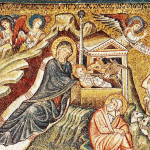We run our website the way we wished the whole internet worked: we provide high quality original content with no ads. We are funded solely by your direct support. Please consider supporting this project.

Incarnation and Covenant
The most distinctive aspect of Jesus’ identity, according to the faith of the historic-orthodox Church, is that Jesus is fully God and fully human—“God Incarnate,” to use the Church’s creedal phraseology. To accurately reflect on the Incarnation, we must avoid the temptation to think abstractly, treating the doctrine of the Incarnation as a mere metaphysical assertion that Christ is God and human. Rather, as T. F. Torrance has in particular stressed, the meaning of the Incarnation is inseparably wrapped up in the biblical narrative of God’s dealing with Israel, and through Israel, with the world. Indeed, he contends that, “the Old Testament is the revelation of the verbum incarnandum” (“word requiring to be incarnate”) while “the New Testament is the revelation of the verbum incarnatum” (“word incarnate”).[1] The doctrine of the Incarnation is thus not merely a claim that God became a human: it’s the claim that the God of Israel became the long-awaited Jewish man who was Israel’s Messiah, and therefore the Messiah for the world.
More specifically, the Incarnation is the fulfillment of both the God-side and human-side of Yahweh’s covenantal relationship with Israel, and therefore with the world. In the words of Torrance,
[Jesus] is himself the God of the covenant which we have broken, but he became man by taking upon himself the humanity of the men and women who broke the covenant, and in himself he is not only the turning of God to humanity, but the turning of humanity to God.[2]
In Christ, Yahweh definitively demonstrates himself to be Israel’s faithful covenant partner precisely by condescending to become a faithful human covenant partner before God on behalf of Israel, and therefore of the world. And it is as Israel’s faithful representative that Jesus not only fulfills the covenant by living a life that was free of covenant breaking; he also fulfills the covenant by appropriating as his own the covenantal curse that is a consequence of all covenant breaking.
Hence, by becoming a human and sacrificing himself on the cross, the God who had bound himself in a covenant relationship with Israel unilaterally fulfilled the promises and obligations of this covenant while unilaterally paying the price for Israel’s failure to live up to this covenant. The one man Jesus Christ becomes the representative suffering servant who thereby fulfills Israel’s roll as suffering servant (Isa. 53). Yahweh’s suffering covenantal faithfulness is thus an essential aspect of the full meaning of the Incarnation and therefore of the Crucifixion and every other aspect of Jesus’ identity and ministry.
[1] Torrance, Incarnation, 45.
[2] Torrance, Atonement, 148.
Photo credit: slack12 via VisualHunt / CC BY-NC-ND
Category: General
Tags: Covenant, Incarnation, Israel
Related Reading

The Cross in the Manger
There has been a strand within the Western theological tradition—one that is especially prevalent in contemporary American Evangelicalism—that construes the significance of the cross in strictly soteriological terms. The cross is central, in this view, but only in the sense that the reason Jesus came to earth was to pay the price for our sin…

Podcast: How is Jesus Both God and Human?
Greg discusses the incarnation from the perspective of “God as Human” rather than “God and Human.” http://traffic.libsyn.com/askgregboyd/Episode_0252.mp3

The Incarnation as an Example of Cross-Cultural Love
Beautiful Faces of Palestine via Compfight Christena Cleveland wrote an excellent piece about the radical cross-cultural nature of the incarnation. I’ve never thought of it quite this way before, but the incarnation is the most profound instance of entering into another culture in a selfless way. Moving outside of our “cultural comfort zone” to more…

What Does It Mean to Be Married to Christ?
The New Testament calls Christ the “bridegroom” and the church his “bride.” To understand what this means can change your life. We need to read this through the lens of first century Jewish marriage. In what follows we’ll highlight six aspects of first century Jewish marriages to see how each sheds light on the New…

Did God Learn Something by Becoming Human? (podcast)
Greg talks about what to do with congregants who are engaging in illegal activity. Also, attention is given to the question of guns in church. Episode 579 http://traffic.libsyn.com/askgregboyd/Episode_0579.mp3

Podcast: How Do You Understand God’s Promises to Israel?
Greg discusses God’s promises to Israel. http://traffic.libsyn.com/askgregboyd/Episode_0208.mp3
